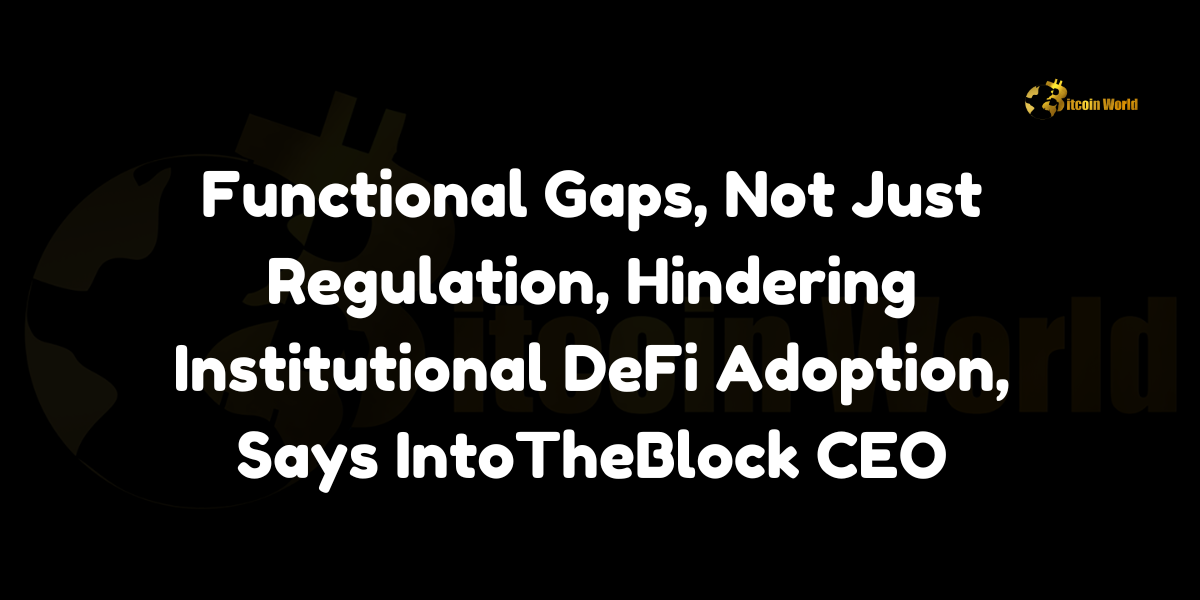Institutional DeFi adoption functional gaps are the real challenge preventing large-scale integration of decentralized finance (DeFi) into traditional financial systems, according to Jesus Rodriguez, CEO of IntoTheBlock. In a recent opinion piece for CoinDesk, Rodriguez argued that while regulatory concerns such as Know Your Customer (KYC) and anti-money laundering (AML) protocols are often cited as obstacles, the actual barriers are functional inefficiencies within the DeFi ecosystem itself.
Functional Barriers to Institutional Adoption
Rodriguez highlighted several key functional gaps that are impeding institutional entry into DeFi:
- Inefficient Capital: One of the primary issues is the inefficient deployment of capital within DeFi protocols. Traditional financial institutions require more efficient use of assets, which is currently lacking in DeFi.
- Fragmented Liquidity: Liquidity within DeFi is often fragmented across multiple platforms and protocols, making it difficult for institutions to access deep, reliable liquidity pools. This fragmentation increases operational complexity and diminishes trust.
- Lack of Institutional-Grade Products: According to Rodriguez, DeFi has yet to develop the kind of robust, institutional-grade investment products that would attract large-scale investment. While tokenized securities, like BlackRock’s tokenized fund, have begun to legitimize the concept of tokenized assets, DeFi still lacks comparable products that meet institutional standards.
Regulatory Concerns vs. Functional Gaps
While regulations such as KYC and AML protocols are important, Rodriguez believes that these are not the main reasons behind the slow institutional adoption of DeFi. Instead, he argues that addressing the functional gaps in the ecosystem—by developing more sophisticated financial tools and better liquidity solutions—will be key to unlocking DeFi’s full potential for large institutions.
- Regulation as a Secondary Concern: Rodriguez emphasized that while regulatory frameworks are a challenge, they are not the primary bottleneck. Functional inefficiencies are preventing institutions from engaging with DeFi on a large scale, and solving these issues should be prioritized.
The Path Forward for Institutional DeFi Adoption
For DeFi to achieve mainstream institutional adoption, Rodriguez suggests that the ecosystem must develop capabilities that cater specifically to institutional needs:
- Building Institutional-Grade Solutions: To attract institutional players, DeFi platforms need to create more advanced financial products that align with the rigorous standards of traditional finance. This includes better risk management tools, secure custody solutions, and more efficient capital allocation.
- Improving Liquidity Structures: DeFi platforms must also work to integrate liquidity across protocols, reducing fragmentation and creating deeper, more reliable liquidity pools. This would make DeFi more appealing to large financial institutions seeking to execute substantial transactions.
Conclusion
The Institutional DeFi adoption functional gaps outlined by Jesus Rodriguez present a clear roadmap for improving DeFi’s appeal to large-scale investors. While regulatory hurdles like KYC and AML protocols are important, the real barriers to entry are the inefficiencies within DeFi itself. Addressing issues such as inefficient capital use, fragmented liquidity, and the lack of institutional-grade products will be critical in unlocking the full potential of DeFi for traditional financial institutions.
To learn more about the innovative startups shaping the future of the crypto industry, explore our article on latest news, where we delve into the most promising ventures and their potential to disrupt traditional industries.
Disclaimer: The information provided is not trading advice, Bitcoinworld.co.in holds no liability for any investments made based on the information provided on this page. We strongly recommend independent research and/or consultation with a qualified professional before making any investment decisions.




